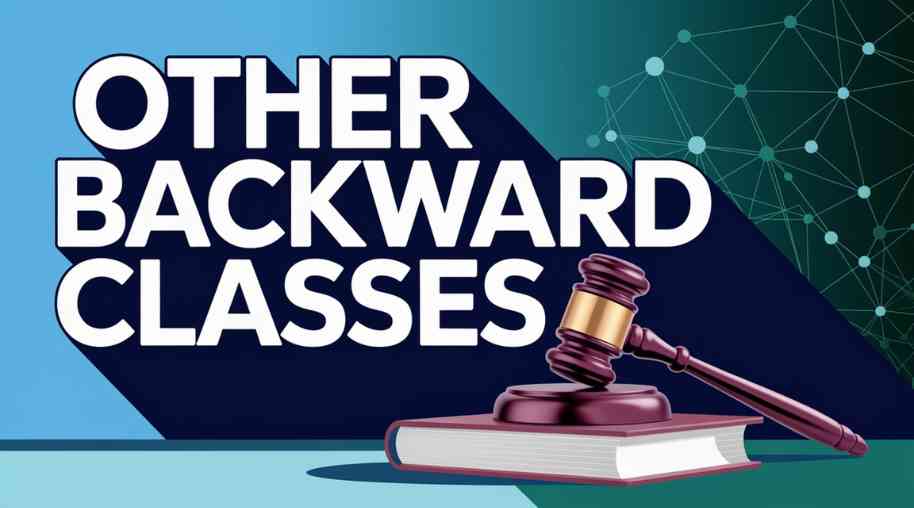OBCs Full Form-Other Backward Classes
by Shashi Gaherwar
0 1023
Other Backward Classes (OBC): Definition, Reservation Policies, and Socio-Economic Impact
Other Backward Classes (OBC) form a significant part of India's social and economic landscape. Recognized by the government as socially and educationally disadvantaged, OBCs are entitled to reservations in education and government jobs to ensure social justice and equality. This article explores the definition, history, reservation policies, and socio-economic impact of the OBC category in India.

Who Are Other Backward Classes (OBC)?
OBCs are a classification of castes in India that fall between the upper castes and Scheduled Castes (SCs) and Scheduled Tribes (STs) in terms of social and economic status. The Government of India defines OBCs as groups that are socially and educationally backward and need special provisions to uplift their status.
History and Evolution of the OBC Category
1. Kaka Kalelkar Commission (1953)
a. The first attempt to identify backward classes in independent India.
b. Recommended affirmative action but lacked specific criteria.
2. Mandal Commission (1979)
a. Headed by B.P. Mandal, the commission was established to examine the socio-economic conditions of OBCs.
b. Recommended 27% reservation for OBCs in government jobs and higher education.
c. Implemented in 1990 by Prime Minister V.P. Singh, leading to nationwide protests and debates.
3. NCL (National Commission for Backward Classes) Formation (1993)
a. Established to identify OBC groups and ensure proper implementation of policies.
b. The commission regularly updates the central list of OBCs.
Reservation and Benefits for OBCs
Educational and Employment Reservations
• 27% reservation in central government jobs and educational institutions.
• Relaxation in age limits for government job applicants.
• Scholarships and fee concessions in schools and colleges.
• Special coaching schemes to prepare OBC students for competitive exams.
OBC Creamy Layer vs. Non-Creamy Layer
The OBC category is further divided into two sub-categories based on economic criteria:
1. OBC Non-Creamy Layer: Eligible for government reservations.
a. Annual family income below ₹8 lakh (as per recent guidelines).
2. OBC Creamy Layer: Not eligible for reservations.
a. Includes families with higher economic status, such as government officers in high ranks or individuals earning above the income threshold.
OBC Caste List and Identification
Each state maintains its own list of OBCs in addition to the central list. Some castes are recognized as OBCs at the state level but not at the central level. The list is periodically revised based on socio-economic surveys.
How to Check OBC Status?
• Visit the National Commission for Backward Classes (NCBC) website.
• Check the State OBC List for locally recognized groups.
• Obtain an OBC Certificate from the local Tehsil office for availing benefits.
Challenges Faced by OBC Communities
1. Unequal Distribution of Benefits
• A large portion of OBC benefits goes to relatively well-off sections within the category.
• Some groups remain economically weak despite reservation policies.
2. Political and Social Controversies
• OBC reservations have been a subject of debate, with calls for modifications to the existing system.
• Demands for increased reservations beyond the 50% limit set by the Supreme Court.
3. Lack of Awareness and Representation
• Many OBC individuals are unaware of their rights and entitlements.
• Underrepresentation in elite educational institutions and high-ranking government positions.
Impact of OBC Reservation on Indian Society
1. Increased Access to Education:
a. Higher enrollment rates in colleges and universities.
b. Rise in OBC representation in prestigious institutions like IITs, IIMs, and central universities.
2. Employment Opportunities:
a. Significant increase in OBC employment in government sectors.
b. Enhanced socio-economic mobility.
3. Political Empowerment:
a. OBC leaders and political parties gaining prominence in national and regional politics.
b. Policy reforms benefiting OBC communities.
Recent Developments and Future Outlook
Expanding Reservations to Private Sector?
• Discussions on extending OBC reservations to the private sector are ongoing.
• Could provide broader employment opportunities.
Increase in Income Limit for Non-Creamy Layer?
• The income limit for determining the creamy layer has been periodically revised (last set at ₹8 lakh per annum).
• Further revisions may include adjustments based on inflation and economic conditions.
Digital Access and Awareness Initiatives
• Government portals providing information on OBC benefits.
• Online scholarship and coaching program applications to increase awareness and reach.
The Other Backward Classes (OBC) category plays a crucial role in India’s socio-economic structure. Reservation policies have enabled many OBC individuals to access better education and job opportunities, leading to upward mobility. However, challenges like unequal benefit distribution and political controversies persist. Moving forward, policies must be refined to ensure equitable opportunities for all OBC groups while promoting social harmony and economic progress.

Share:








Comments
Waiting for your comments